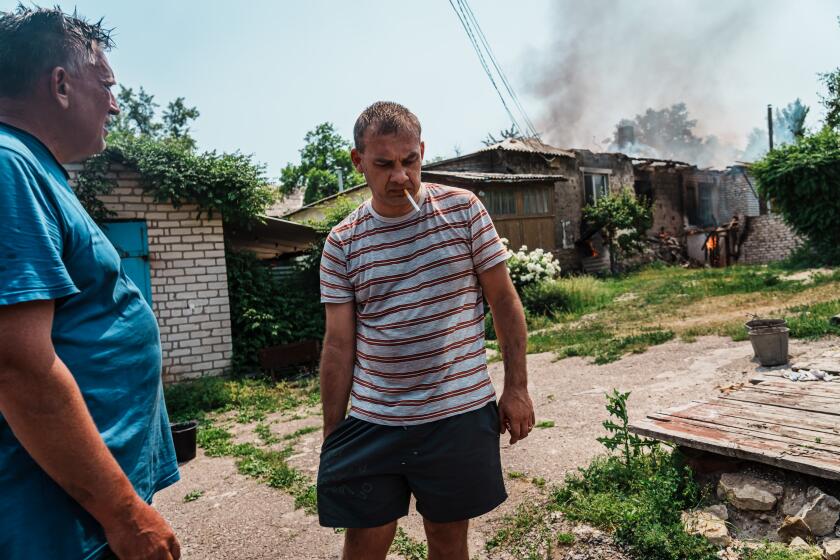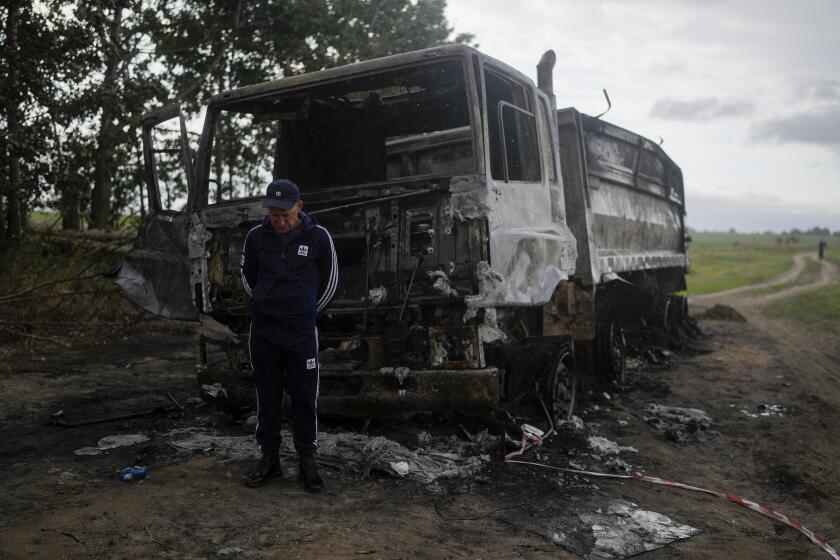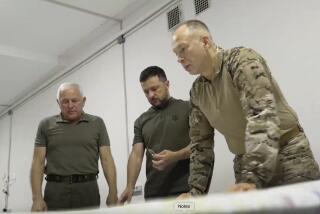Russia strikes ammunition depot in western Ukraine as fighting rages in east
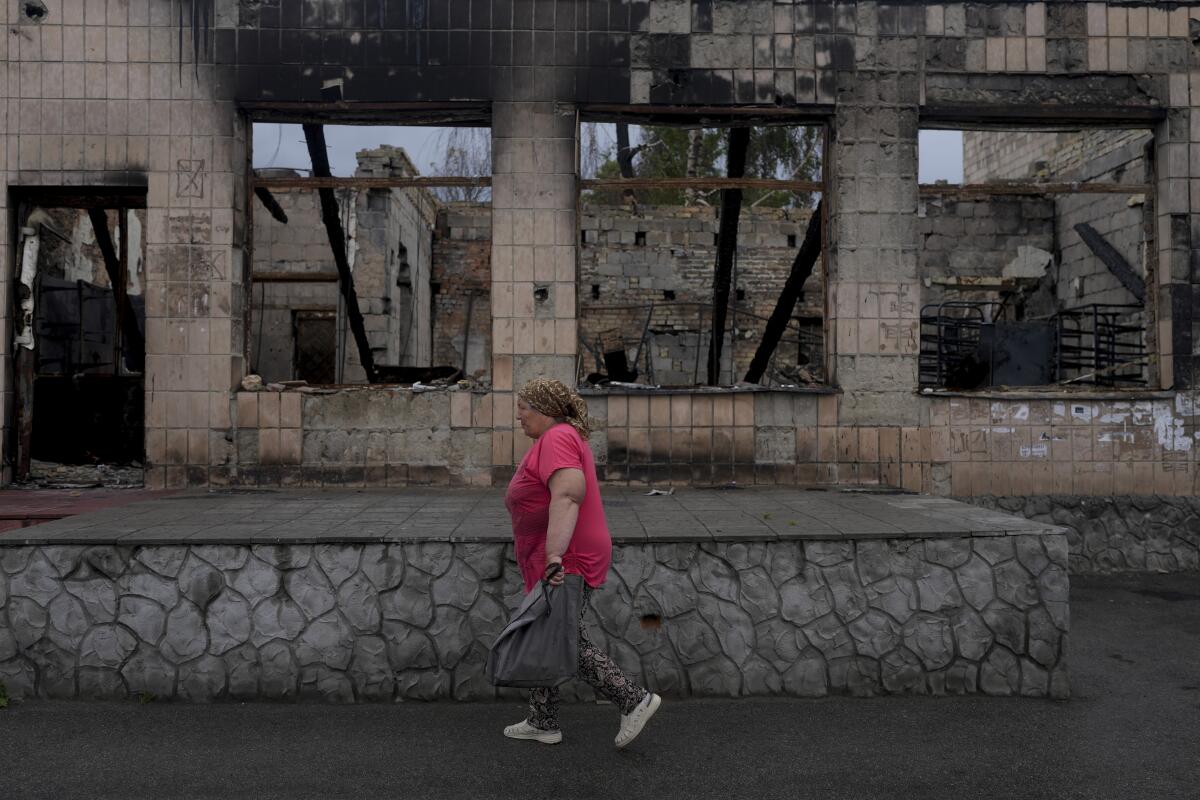
- Share via
KYIV, Ukraine — The Russian military said Wednesday that it used long-range missiles to destroy a depot in western Ukraine’s Lviv region where ammunition for NATO-supplied weapons was being stored.
Those strikes came as fighting raged for the city of Severodonetsk in the eastern Donbas area, the key focus of Russia’s offensive in recent weeks.
Moscow-backed separatists accused Ukrainian forces of sabotaging an evacuation of civilians from the city’s besieged Azot chemical plant, where about 500 civilians and an unknown number of Ukrainian fighters are believed to be sheltering. It wasn’t possible to verify that claim.
A humanitarian corridor from the Azot plant had been announced a day earlier by Russia.
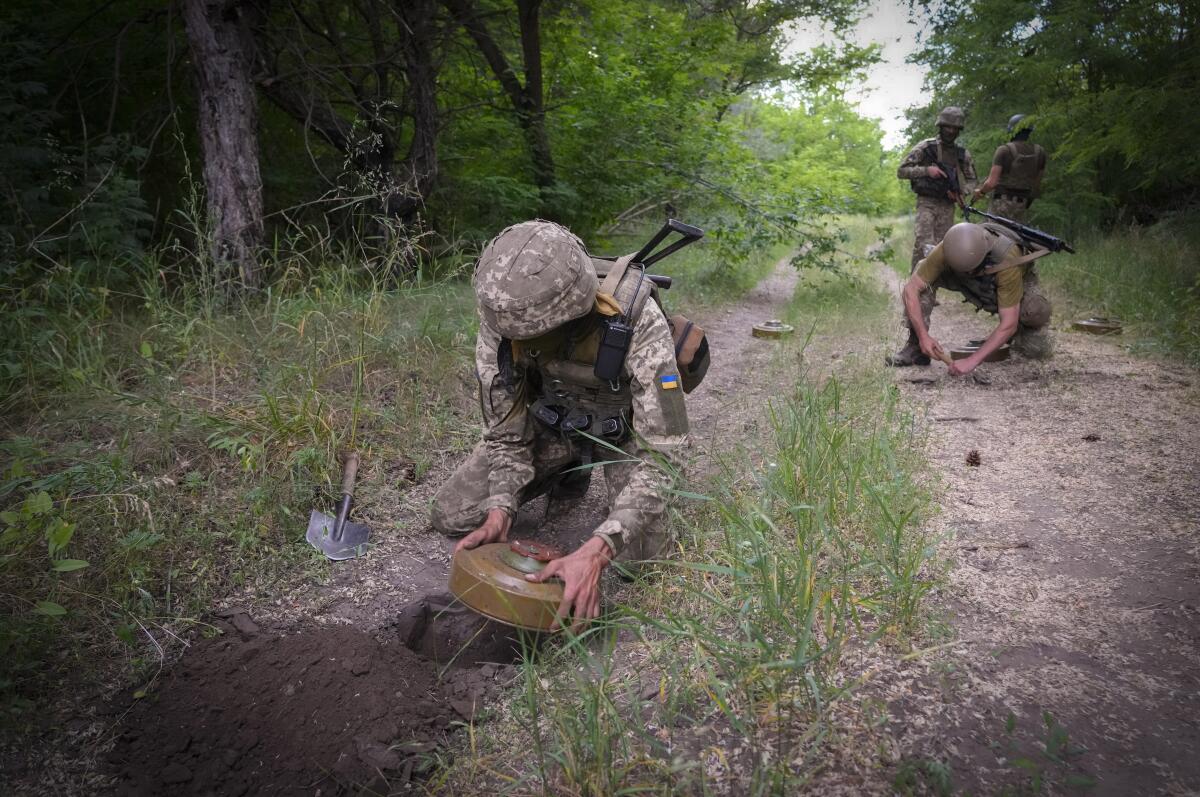
The Ukrainian governor of Luhansk, Serhiy Haidai, on Wednesday refused to comment on Russian statements regarding a humanitarian corridor, but told
the Associated Press that “heavy fighting in Severodonetsk continues today as well.” The situation in the city is getting worse, Haidai acknowledged, because the Russian forces have more manpower and weapons.
“But our military is holding back the enemy from three sides at once,” Haidai said. “The enemy is advancing because of significant advantage in artillery and people, but the Ukrainian army is holding on to its positions in the city.”
Russian Defense Ministry spokesman Igor Konashenkov said that Russian forces used high-precision Kalibr missiles to destroy the ammunition depot near the town of Zolochiv, which is in the Lviv area near the border with NATO member country Poland.
A sense of death hangs over cities in eastern Ukraine
Konashenkov said M777 howitzers, a type supplied by the U.S., were being stored there. He said that Russian airstrikes also destroyed Ukrainian “aviation equipment” at a military aerodrome in the southern region of Mykolaiv, he said.
The strikes came as Ukraine keeps up its pressure on the West to deliver more arms and as members of the North Atlantic Treaty Organization pledge more heavy weapons for the embattled country.
The U.S. announced that it will send an additional $1 billion in military aid to Ukraine, as Washington and its allies provide longer-range weapons they say can make a difference in a fight where Ukrainian forces are outnumbered and outgunned by the Russian invaders.
In recent days, Ukrainian officials have spoken of the heavy human cost of the war, with the fierce fighting in the east becoming an artillery battle that has seen Kyiv’s forces overpowered.
“The losses, unfortunately, are painful, but we have to hold out,” Ukrainian President Volodymyr Zelensky said late Tuesday in his nightly video address. “The more losses the enemy suffers there, the less strength it will have to continue the aggression. Therefore, the Donbas is key to determining who will dominate in the coming weeks.”
Russian forces are laying mines and other explosives that disrupt agriculture and rebuilding and leave the risk of death even after the fighting stops.
Mykhailo Podolyak, a Zelensky advisor, tweeted Wednesday that he gets a daily message from the Ukrainian defenders there saying: “We are holding on, just say: when to expect the weapons?” He said that is the same message he has for NATO leaders.
The prime ministers of Albania and Montenegro visited Kyiv on Wednesday to meet with Zelensky and show their sympathy and support for the Ukrainian people. The two leaders, from a region that was the site of bloody ethnic wars after the breakup of Yugoslavia in the 1990s, visited the towns of Borodyanka and Irpin, near Kyiv, to view the destruction Russian forces wrought before their pullout.
French President Emmanuel Macron suggested Wednesday that he too would travel to Kyiv soon, but said he would not publicly discuss details of any such trip.
Meanwhile, comments by the deputy chair of Russia’s Security Council, former President Dmitry Medvedev, suggested that Russia appears intent on the destruction of its neighbor.
In a post on the messaging app Telegram, he wrote that he saw reports that Ukraine wants to receive liquefied natural gas in a deal with its “overseas masters,” with payment due in two years.
He added: “But there’s a question. Who said that in two years Ukraine will even exist on the map of the world?”
Medvedev has been making harsh statements against Ukraine and the West on Telegram since the war began.
Breaking News
Get breaking news, investigations, analysis and more signature journalism from the Los Angeles Times in your inbox.
You may occasionally receive promotional content from the Los Angeles Times.
A United Nations delegation investigating war crimes in Ukraine has visited areas of the country that were held by Russian troops and says there is evidence that could support war crimes allegations.
The delegation chaired by Erik Mose, a Norwegian judge, visited sites including the Kyiv suburbs of Bucha and Irpin, where Ukrainian authorities have accused Russia of mass killings of civilians.
“At this stage we are not in a position to make any factual findings or pronounce ourselves on issues of the legal determination of events,” Mose said.
“However, subject to further confirmation, the information received and the visited sites of destruction may support claims that serious violations of international human rights law and international humanitarian law, perhaps reaching war crimes and crimes against humanity, have been committed in the areas,” he said.
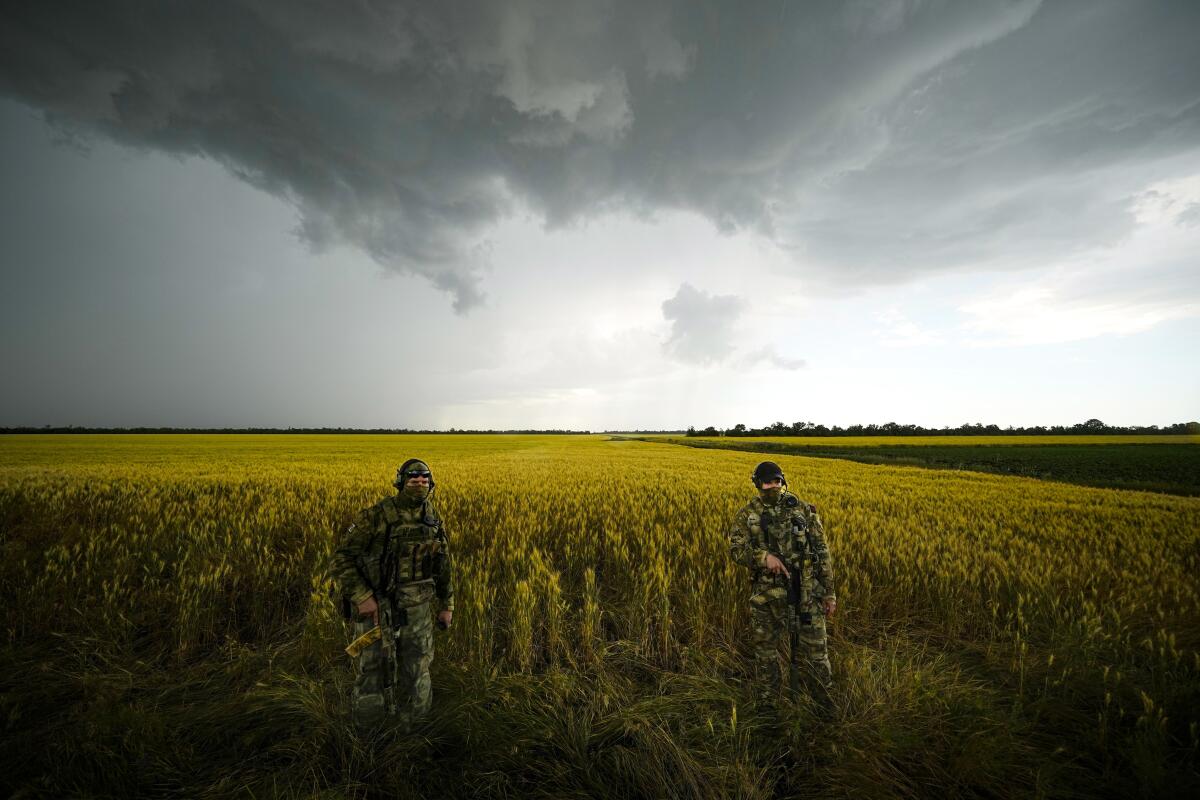
With Ukrainian and international organizations investigating war crimes cases, Mose expressed concern over the risk of investigations “overlapping” or causing witnesses more trauma by going over the same events repeatedly.
A U.N. official who visited Ukraine last week said that nearly two-thirds of the country’s children have been uprooted during the war.
Afshan Khan, the Europe and Central Asia director for UNICEF, said Tuesday that 277 children have been killed and 456 injured, mostly because of explosives used in urban areas. She said the number of damaged schools is probably in the thousands, and only about 25% of schools in Ukraine are operational.
Meanwhile, President Biden said he was working closely with European partners to get 20 million tons of Ukrainian grain, currently blocked from leaving Black Sea ports because of the war, onto international markets.
He said Tuesday that the plan would involve building temporary storage silos on Ukraine’s borders to deal with the problem of the different rail gauges that Ukrainian and other European railway systems use.
Ukraine is one of the world’s biggest exporters of wheat, corn and sunflower oil. The lack of Ukrainian grain on world markets is threatening to exacerbate food shortages, and inflation across the globe. Many African and Middle Eastern countries rely heavily on Ukrainian grain and could face problems feeding their people without it.
More to Read
Sign up for Essential California
The most important California stories and recommendations in your inbox every morning.
You may occasionally receive promotional content from the Los Angeles Times.
